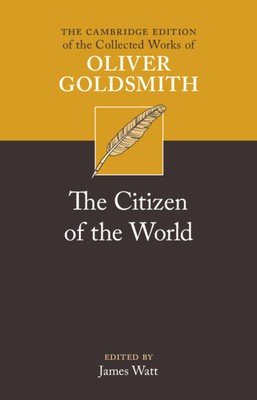
- We will send in 10–14 business days.
- Author: Oliver Goldsmith
- Publisher: Cambridge University Press
- ISBN-10: 1108479146
- ISBN-13: 9781108479141
- Format: 14.8 x 22 x 5.4 cm, kieti viršeliai
- Language: English
- SAVE -10% with code: EXTRA
Reviews
Description
The Citizen of the World is a highly readable yet deceptively sophisticated text, using the popular eighteenth-century device of the imaginary observer. Its main narrator, the Chinese philosopher Lien Chi Altangi, draws on traditional ideas of Confucian wisdom as he tries (and sometimes fails) to come to terms with the commercial modernity and spectacle of imperial London. Goldsmith explores a moment of economic and social transformation in Britain and at the same time engages with the ramifications of a global conflict, the Seven Years' War (1756-63). He also uses his travelling Chinese narrator as a way of indirectly addressing his own predicament as an Irish exile in London. This edition provides a reliable, authoritative text, records the history of its production, and includes an introduction and explanatory notes which situate this enormously rich work within the political debates and cultural conflicts of its time, illuminating its allusiveness and intellectual ambition.
EXTRA 10 % discount with code: EXTRA
The promotion ends in 23d.19:00:26
The discount code is valid when purchasing from 10 €. Discounts do not stack.
- Author: Oliver Goldsmith
- Publisher: Cambridge University Press
- ISBN-10: 1108479146
- ISBN-13: 9781108479141
- Format: 14.8 x 22 x 5.4 cm, kieti viršeliai
- Language: English English
The Citizen of the World is a highly readable yet deceptively sophisticated text, using the popular eighteenth-century device of the imaginary observer. Its main narrator, the Chinese philosopher Lien Chi Altangi, draws on traditional ideas of Confucian wisdom as he tries (and sometimes fails) to come to terms with the commercial modernity and spectacle of imperial London. Goldsmith explores a moment of economic and social transformation in Britain and at the same time engages with the ramifications of a global conflict, the Seven Years' War (1756-63). He also uses his travelling Chinese narrator as a way of indirectly addressing his own predicament as an Irish exile in London. This edition provides a reliable, authoritative text, records the history of its production, and includes an introduction and explanatory notes which situate this enormously rich work within the political debates and cultural conflicts of its time, illuminating its allusiveness and intellectual ambition.


Reviews